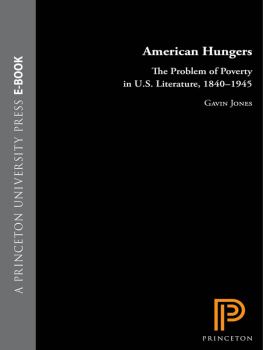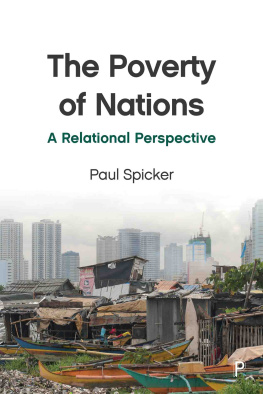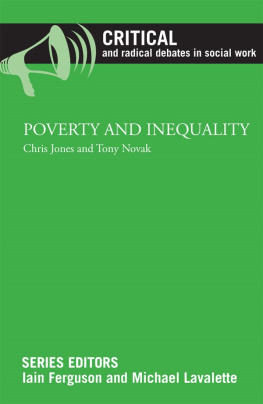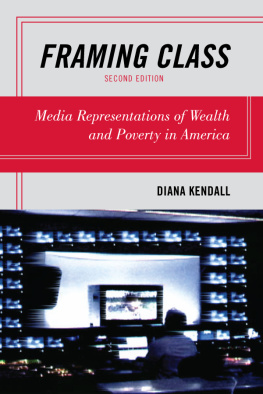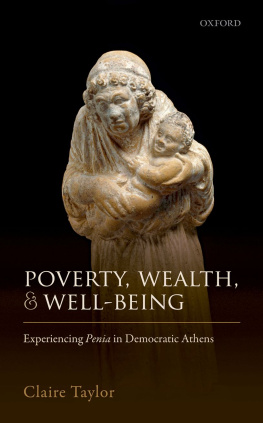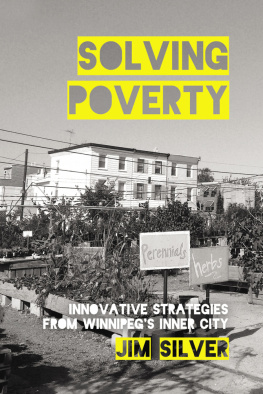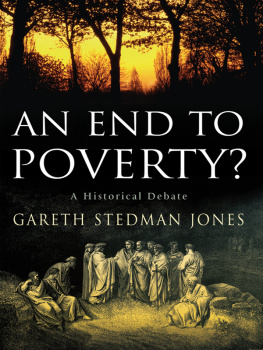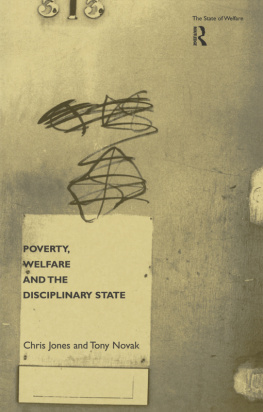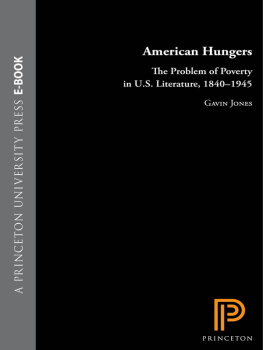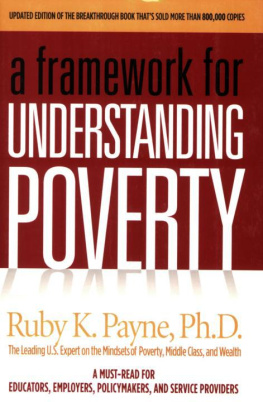
AMERICAN HUNGERS
20 | 21
WALTER BENN MICHAELS, Series Editor
From Guilt to Shame by Ruth Leys
William Faulkner: An Economy of Complex Words by Richard Godden
American Hungers: The Problem of Poverty in U.S. Literature, 18401945 by Gavin Jones

Copyright 2008 by Princeton University Press
Requests for permission to reproduce material from this work should be sent to Permissions, Princeton University Press Published by Princeton University Press, 41 William Street, Princeton, New Jersey 08540
In the United Kingdom: Princeton University Press, 3 Market Place, Woodstock, Oxfordshire OX20 1SY
All Rights Reserved
Library of Congress Cataloging-in-Publication Data
Jones, Gavin Roger, 1968-American hungers : the problem of poverty in U.S. literature, 18401945 / by Gavin Jones.
p. cm. (20/21)
Includes bibliographical references and index.
ISBN 978-0-691-127538 (alk. paper)
1. American literature19th centuryHistory and criticism.
2. Poverty in literature. 3. American literature20th centuryHistory and criticism. 4. Social classes in literature. 5. Literature and societyUnited StatesHistory. I. Title.
PS217.P67J66 2007
810.9355dc22 2007008406
British Library Cataloging-in-Publication Data is available
This book has been composed in Helvetica Neue Light
Printed on acid-free paper.
press.princeton.edu
Printed in the United States of America
10 9 8 7 6 5 4 3 2 1
To the memory of my mother,
MAUREEN JONES
You can philosophize, gentle reader on the evils of amalgamation. Want is a more powerful philosopher and teacher.
Harriet E. Wilson,Our Nig
CONTENTS
INTRODUCTION
The Problem of Poverty in Literary Criticism |
ONE
Beggaring Description: Herman Melville and Antebellum Poverty Discourse |
TWO
Being Poor in the Progressive Era: Dreiser and Wharton on the Pauper Problem |
THREE
The Depression in Black and White: Agee, Wright, and the Aesthetics of Damage |
LIST OF ILLUSTRATIONS
ACKNOWLEDGMENTS
F OR A NUMBER of important conversations early on, I am indebted to Daniel Aaron, Hugh McNeal, Peter McNeal, Elaine Scarry, Jeffrey Dolven, Sudhir Venkatesh, Samuel Otter, and the late Ian MacKillop. This project originated in Harvards Society of Fellows, and grew in Stanfords Humanities Center; I am grateful for the collegial environment and the financial support of both institutions. Additional help toward production and research costs has been provided by Gordon and Dailey Pattee, and by Stanfords Office of the Vice Provost for Undergraduate Education. My thinking has been disciplined and energized by the following scholars, all of whom read and commented generously on chapter drafts: Denise Gigante, Arnold Rampersad, Shelley Fisher Fishkin, David Riggs, Lori Merish, Robert Ferguson, Maria Farland, Lee Mitchell, Tobias Gregory, and Bruce Simon. My colleagues Robert Polhemus, Seth Lerer, and Sianne Ngai offered encouragement at crucial times. Amanda Glesmann has been simply inspirational in helping to select and present the illustrations (thanks also to Davey Hubay for some sharp photography), while William Clayton assisted me diligently in the late stages of bibliographical research. A single conversation with Jay Fliegelman is worth a year of thinking on your own; this book has benefited immeasurably from many such conversations. Special thanks go to Walter Michaels for his intellectual generosity and his unwavering belief in the project. I am grateful to the anonymous readers for Princeton University Press, who offered helpful suggestions, and to Hanne Winarsky for her commitment and her skill in piloting the book through the publication process. Gordon Hutner and Paul Giles gave timely advice to publish sections of the developing manuscript. Accordingly, an earlier version of the introduction appeared as Poverty and the Limits of Literary Criticism in American Literary History, vol. 15.4 (Winter 2003), pp. 76592, published by Oxford University Press; and an earlier version of my discussion of Edith Wharton in Part III appeared as Poverty, Gender, and Literary Criticism: Reassessing Edith Whartons The House of Mirth in Comparative American Studies, vol. 1.2 (Summer 2003), pp. 15377, copyright Sage Publications. Both are reprinted here with permission. Finally, this book would not have been possible without the love and support of my family. My children, Eli and Hazel, have adorably distracted me throughout, while Judy Richardson has helped me get through all the difficult bits, and has filled the margins of writing with much more besides.
PREFACE
T HE PURPOSE of this book is to redress the neglect of poverty as a category of critical discourse in the study of American literature and culture. Despite its prominence as a subject in the social sciences, poverty has remained unfocused in literary studies that privilege the cultural identity of the marginalized. It has been de-emphasized in accounts of the class consciousness of workers, and obscured by critical methodologies designed to deconstruct such monolithic ideas as the poor. Scholars have largely overlooked the complexity of poverty as a subject of representation that runs throughout U.S. literature, rather than a subject that congregates in a particular literary period, movement, or genre, or that preoccupies a single writer. There may no longer be the poverty of theory in American studies scholarship that Robert Sklar noted in 1975. But there has been little theory of poverty, and thus virtually no critical and theoretical framework to situate literary works that have grappled with the ethical, cultural, and linguistic difficulties of poverty as a substantive category of social being.
American Hungers is not an exhaustive literary history of writing about poverty in the United States (an undertaking far beyond the scope of a single study) but an attempt to revise our critical idiom by offering fresh ways to view both established and less established texts. Recent scholarship has made powerful cases for the work of previously neglected writers, as pressing concerns with race, ethnicity, gender, and (to a lesser extent) class have recovered a vast range of material. Yet too often analyses of writing by or about the socially marginalized have referenced poverty with little sense of the ideological battles surrounding it; poverty has remained a vaguely descriptive term and not a dynamic category that develops structurally and thematically across textual space. What is needed now, I believe, is an unlocalized critical language that helps us see how poverty, as a fused social and cultural concern, operates in literary texts in complex ways that move beyond the perspectives of discrete classes, races, or genders, and that shape the contours of both mainstream and minority traditions of writing.
To confront poverty in an American context is in many ways a shocking act. Attempts to understand the persistence of poverty have remained remarkably controversial aspects of American intellectual and social history, just as they continue to unsettle national ideologies and to disrupt conventional ways in which we think of class and cultural identity. The political contradictions of poverty necessitate close linguistic analysis. Thus, I chart the development of poverty as a literary polemic through case studies of selected authors and texts, all of which powerfully animateand are animated byimportant historical and cultural contexts in which awareness of poverty developed. The three parts of this book treat specific texts within three historical periods marked by downturns and depressions that heightened public and political consciousness of economic inequality. Herman Melvilles prolonged literary treatment of poverty, which ranged from
Next page
